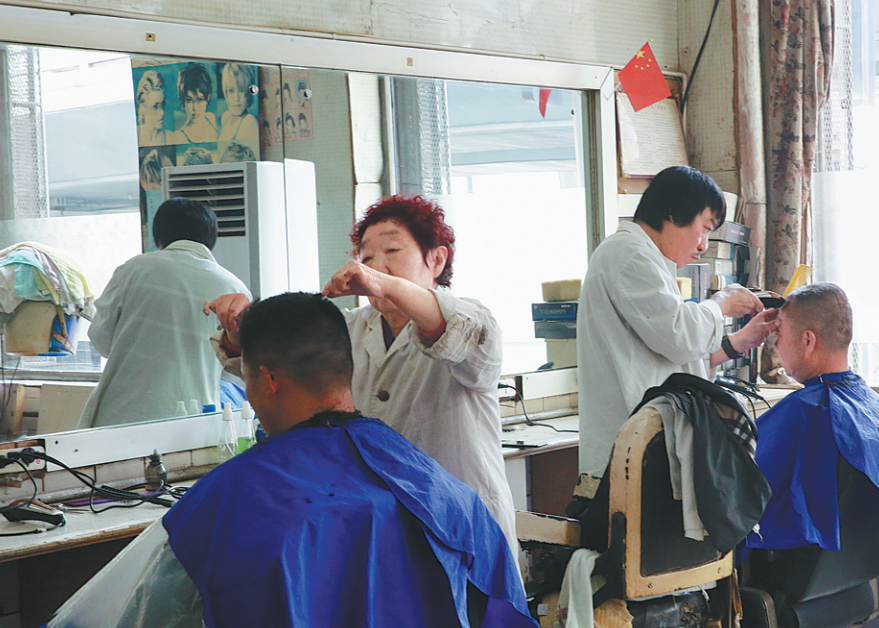Traditional salon gives clients a close shave with history
By SUN RUISHENG in Taiyuan and LI HONGYANG in Beijing | CHINA DAILY | Updated: 2021-06-24 09:44

Customers seeking haircuts come from all over the country for a cut like no other
On a street corner in Taiyuan, Shanxi province, two hairdressers, one 70, the other 50, still serve residents from the salon in the century-old house they've occupied for years. The vintage fashion items in the salon and the old-fashioned skills they mastered decades ago attract retro fans from all across the country.
Wu Zhanmei, 70, began to work in the Huayi Hair Salon in 1978. "Some trendy hairstyles nowadays are actually similar to those of the 1980s, just with different names," she said. "For example, the Bob is what we used to call the Revolution haircut, which became popular during the early revolutionary years, so we can handle these new trends."
Although most regular customers are elderly, Li Feng, a 21-year-old college student from Jiangxi province traveling in Taiyuan, visited the salon after finding out about it online. It was 50-year-old Li Shimin, who has worked at Huayi for 33 years, who cut his hair.
"I came to experience a traditional haircut, and it turned out to be good. The hairdresser didn't talk too much or try to sell me products," Li Feng said.
The fading paint on the nine iron chairs, in service for 66 years and as old as the salon itself, and vintage items, including the white uniforms Wu and Li wear, the porcelain wash basin and the iron hair dryers, bring back memories of the past.
In recent years, Huayi has frequently been featured in local and national media outlets, and now Wu and Li accept a lot of young visitors from Shanghai, Qingdao in Shandong province, and even Taiwan.
"We don't worry about business because some classic hairstyles will never be out of date. Moreover, we offer the unique service of soap and razor shaves," Li said.
Wu recalls that for decades, the salon was one of the busiest barber shops in the city.
"Back then, 14 barbers worked here on shifts, day and night, to cater to the constant stream of customers because there were only a few hair salons here," she said.
Now, Wu and Li are the only two remaining. They receive about 30 customers, but they still follow the old rule of opening at 8 am and closing at 8 pm, and only take holidays during the Spring Festival.
The Huayi belongs to a publicly-owned service company in the city's Xinghua district, so the pair don't pay rent, only maintenance fees.
Each earns about 3,000 to 4,000 yuan ($465 to $620) a month, far less than barbers in modern, private salons.
"I am not here to make big money, but to stay busy and feel fulfilled every day," Wu said.
Since Wu's children got married, she said she has no major expenses, but Li's son is still at college and that places some pressure on him.
"Fortunately, my son is studying at the local police school and gets scholarships every semester, which eases my burden. But when he is of marrying age, I will need to get a house ready for him, and that will be costly," Li said.
"Despite that, I don't want to change my job. I've been here for so long, it's like my home. Also, as one of the last apprentices of the old salon, I feel obliged to pass my skills on to someone else."
However, the meager salary at the Huayi has made many young apprentices quit.
"Our skills are about to be lost," Wu said.
For urban planning reasons, the salon faced the threat of demolition in 2013 and again in 2016.
"Our old customers said that if the house was demolished, they would follow us wherever we went. But I felt sad, and I tossed and turned every night," Wu said.
Fortunately, due to Taiyuan's emphasis on the protection of historical buildings, the house was saved. Now, Wu and Li hope they can get support from all parties to permit the old salon to survive.
"Huayi is like a museum of old Taiyuan memories. We'll stick to our jobs, no matter how hard it is. The only problem is that we need apprentices to pass on our traditional skills," Wu said.
Peng Ke'er and Zhang Siyu contributed to this story.

























